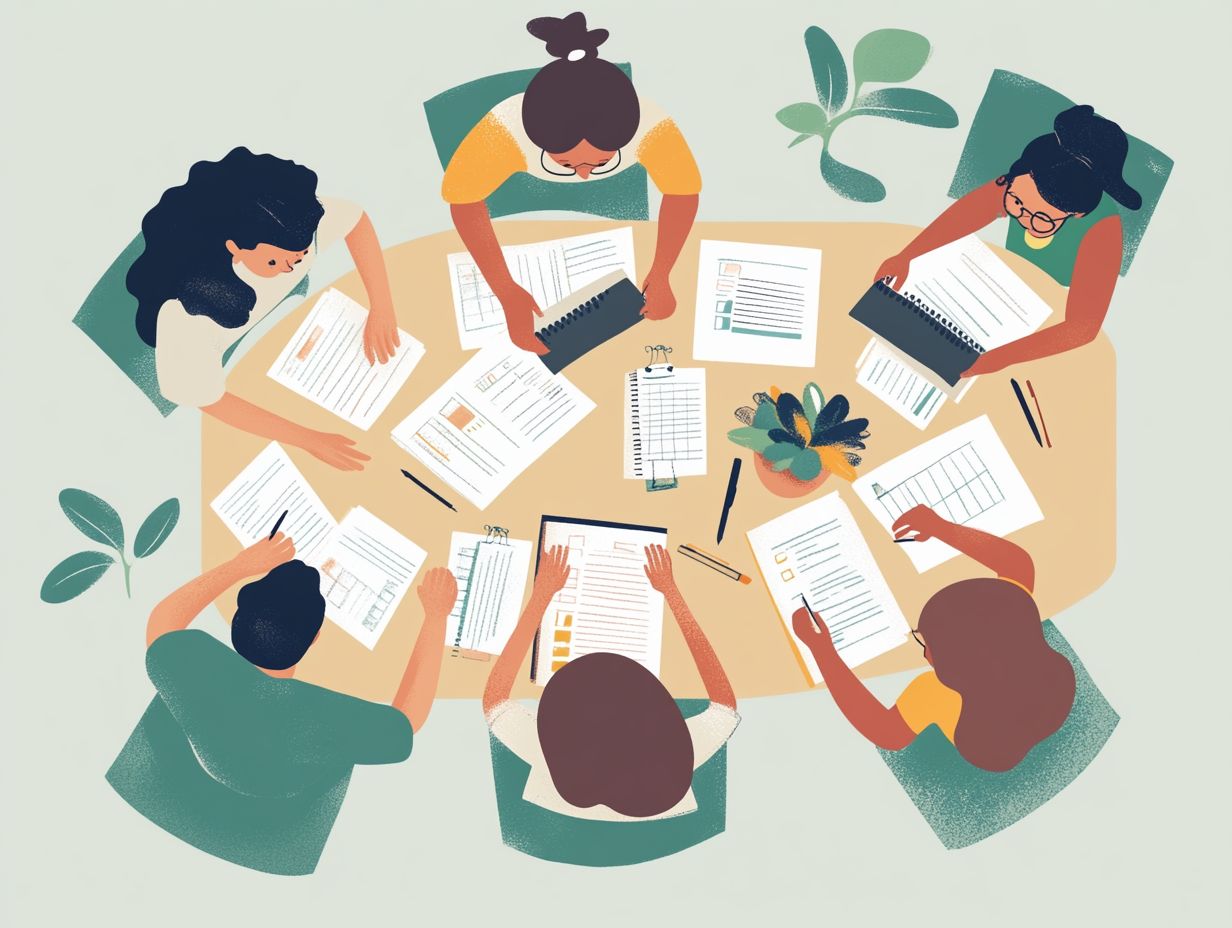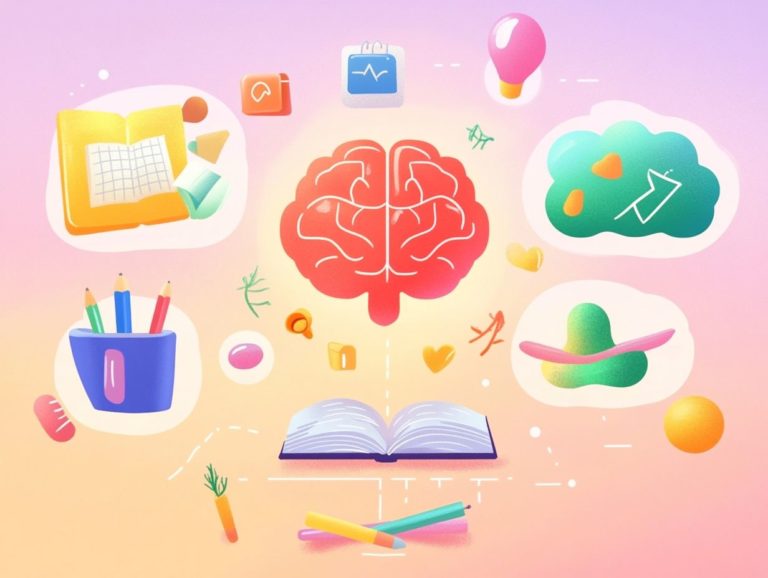5 tips for adapting to different test formats
Navigating the world of assessments can be quite a challenge, especially with the various test formats available.
Whether you’re tackling multiple choice, short answer, or essay exams, each format requires a distinct approach. Get ready to discover five essential tips that will transform how you approach tests, starting with understanding the test format ahead of time and refining your time management skills.
You will find key strategies tailored for different types of tests, ensuring you re well-prepared for whatever challenges lie ahead. Immerse yourself in these insights to elevate your confidence and performance!
Contents
Key Takeaways:

- Know the test format to avoid surprises.
- Practice with different test formats to build your skills and confidence.
- Read and understand the instructions for each test format to ensure you answer correctly.
1. Know the Test Format Beforehand
Understanding the test format in advance is crucial for you as a high school student. It equips you with the preparation strategies necessary to tackle various assessments, from multiple-choice quizzes to true-false questions and subjective answers.
By familiarizing yourself with each format, you can streamline your study habits, boost your confidence, and enhance your academic performance. Understanding the test format is key to success, as recognizing the nuances of different question structures helps you develop effective strategies for studying and test-taking.
Take the time now to study the specific structure of each test format. Tailor your study sessions to address the unique challenges each type presents. For example, knowing that multiple-choice questions often include wrong answer choices meant to confuse you can shape how you practice your reasoning skills, and using 5 tips for creating practice test questions can further enhance your preparation.
Customizing your study materials effectively bridges the gap between your knowledge and the test format, fostering a more productive learning experience.
Teachers are here to help you succeed! They provide critical insights and guidance on effective strategies, helping you navigate the complexities of various assessments. This comprehensive approach not only eases anxiety but also nurtures a proactive mindset towards learning.
2. Practice with Different Test Formats
Practicing with different test formats is essential for reducing test-taking anxiety and boosting your confidence during actual exams. It allows you to become familiar with the expectations of both multiple-choice and subjective questions.
Incorporate various practice methods like utilizing sample tests from Washington University or exploring online resources designed for subjects such as math and science. This will significantly enhance your preparation.
These resources offer a diverse range of problem types and difficulty levels, enabling you to challenge yourself effectively. Remember, repetition is key for cementing knowledge and improving memory retention.
As you engage with these practice exams, focus on the feedback you receive. It will not only help you identify your weaknesses but also guide you in developing effective study habits. By addressing these areas, you can make meaningful strides toward your academic success.
3. Understand the Instructions Carefully

Understanding the instructions provided for each exam is crucial for you. Clarity in guidance can significantly enhance your performance and reduce stress during the test-taking process.
When you take the time to read the instructions thoroughly, you set yourself up for success and minimize the chances of misinterpretation, which can lead to incorrect answers or the omission of critical components.
Approach each instruction with focus; consider highlighting key points or making notes on what is being asked. Allocate a few minutes before diving into the exam questions to ensure you fully grasp the requirements.
This strategy fosters a clearer understanding and instills confidence, enabling you to navigate through the test more effectively and efficiently.
4. Use Time Management Strategies
Effective time management is vital during exams. It reduces stress and boosts your performance.
By ensuring that each section of the test gets the attention it deserves, you can avoid the frantic rush that often leads to mistakes. Consider allocating specific time slots for different types of questions. This approach helps you focus clearly on each segment, enhancing your comprehension.
Practicing your pacing in mock exams familiarizes you with the test format and boosts your confidence in time management.
Maintaining an organized study schedule complete with prioritized tasks and regular breaks promotes a disciplined approach to preparation. Getting organized not only helps you remember information but also empowers you to ace your exams!
5. Stay Calm and Focused During the Test
Staying calm and focused during tests is crucial for success! Effective breathing exercises and relaxation techniques can alleviate test-taking anxiety and enhance concentration.
You can incorporate simple practices into your routine. For instance, deep breathing where you inhale slowly through your nose and exhale through your mouth helps lower your heart rate and clear racing thoughts.
Fostering a positive mindset shifts your focus away from the fear of failure. Engaging in short meditation sessions, even just a few minutes before the test, creates a mental space conducive to learning.
These methods not only calm your nerves but also empower you to approach challenges with a clearer, focused mindset.
What Are the Different Types of Test Formats?

You will encounter several distinct types of test formats. These include multiple-choice questions, true-false statements, subjective questions, and matching exercises. To excel in your assessments, consider applying 7 strategies for effective test-taking, as each format demands unique preparation techniques.
Understanding the nuances of each format is crucial for effective studying. For example, multiple-choice questions test recognition and recall abilities. Practicing quizzes and using flashcards can be incredibly beneficial.
True-false questions require keen attention to detail and a solid grasp of concepts, prompting thorough reviews and discussions.
Subjective questions call for critical thinking and clarity in expression. Writing practice essays or participating in peer reviews can significantly enhance performance.
Matching exercises assess your ability to connect concepts or ideas. You might find it helpful to create association maps or use apps that reinforce learning with visual aids.
By tailoring your preparation to each format’s demands, you boost your confidence and improve your chances of success on exams!
How Can One Prepare for Multiple Choice Tests?
Preparing for multiple-choice tests requires a strategic approach that blends effective study materials, practice tests, and a solid understanding of the subject matter.
To prepare effectively, begin by reviewing your class notes and textbooks. Extract key concepts and summaries that highlight critical information.
Incorporating practice tests tailored to the exam format enhances your readiness, helping you familiarize yourself with the question style and pacing. Recognizing common question patterns like recurring themes or specific distractors can significantly improve your answer accuracy.
By actively engaging with the materials and regularly testing yourself, you ll build confidence and enhance your retention of important facts, paving the way for better outcomes on exam day.
What Are the Best Strategies for Short Answer Tests?
To excel in short answer tests, adopt strategies that emphasize clarity and structured writing. Provide succinct responses that directly address the questions.
Understanding the specific requirements of each question is crucial. Without this comprehension, even well-crafted answers can fall short.
Enhance your skills by engaging in writing exercises that prioritize brevity. Try summarizing paragraphs in a single sentence or tackling potential test questions within a strict word limit.
Familiarizing yourself with common formats and question types builds your confidence and improves your performance.
Seek feedback on your writing for valuable insights into areas for improvement. This reinforces effective techniques and leads to more focused and relevant answers that resonate with evaluators.
How Can One Tackle Essay Tests?

Tackling essay tests requires mastering writing organization, structure, and the ability to think clearly.
Start with an introduction that captivates your reader and sets the stage. The body should provide well-organized points supporting your main argument.
Conclude with a strong closing that reinforces your key ideas and leaves a lasting impression.
Use brainstorming techniques to generate ideas let your thoughts flow freely before organizing them. Creating an outline enhances clarity and ensures a logical progression.
What Are the Key Differences Between Computer-Based and Paper-Based Tests?
Understanding the differences between computer-based and paper-based tests is essential, as these formats influence your test-taking strategies.
Each format has its advantages and disadvantages. Computer-based tests offer immediate feedback and diverse question types, helping you acclimate to digital environments.
In contrast, paper-based tests can reduce distractions and may feel more comfortable for traditional learners.
Adapt your study techniques accordingly. Practice on a computer for digital tests while refining your handwriting and time management for paper tests. This boosts your readiness and confidence.
How Can One Adapt to Open Book Tests?
To adapt to open book tests, shift your preparation mindset. Focus on understanding concepts rather than memorizing facts.
This way, you can use your study materials effectively during the exam.
Organizing your notes is crucial. Ensure everything is at your fingertips when time is tight.
Creating a study guide with key concepts streamlines your review process.
Reviewing past tests familiarizes you with question types and highlights important areas for study.
Your real advantage combines knowledge with resourcefulness. Quick access to materials helps you grasp complex ideas effortlessly.
Frequently Asked Questions
What are the benefits of adapting to different test formats?
Adapting improves test-taking skills and reduces anxiety. It prepares you for various challenges!
Why is it important to familiarize yourself with different test formats?
Understanding test formats helps you know what to expect. This confidence allows you to perform better.
How can I adapt to multiple-choice test formats?
Read questions carefully. Eliminate wrong options, and use educated guesses wisely!
What strategies can I use to adapt to essay test formats?
Create an outline. Manage your time, answer directly, support your points, and proofread!
How can I prepare for open-ended test formats?
Practice organizing thoughts and using examples. Always read instructions carefully!
What should I keep in mind when adapting to true/false test formats?
Read each statement carefully. Consider context and avoid making assumptions.





